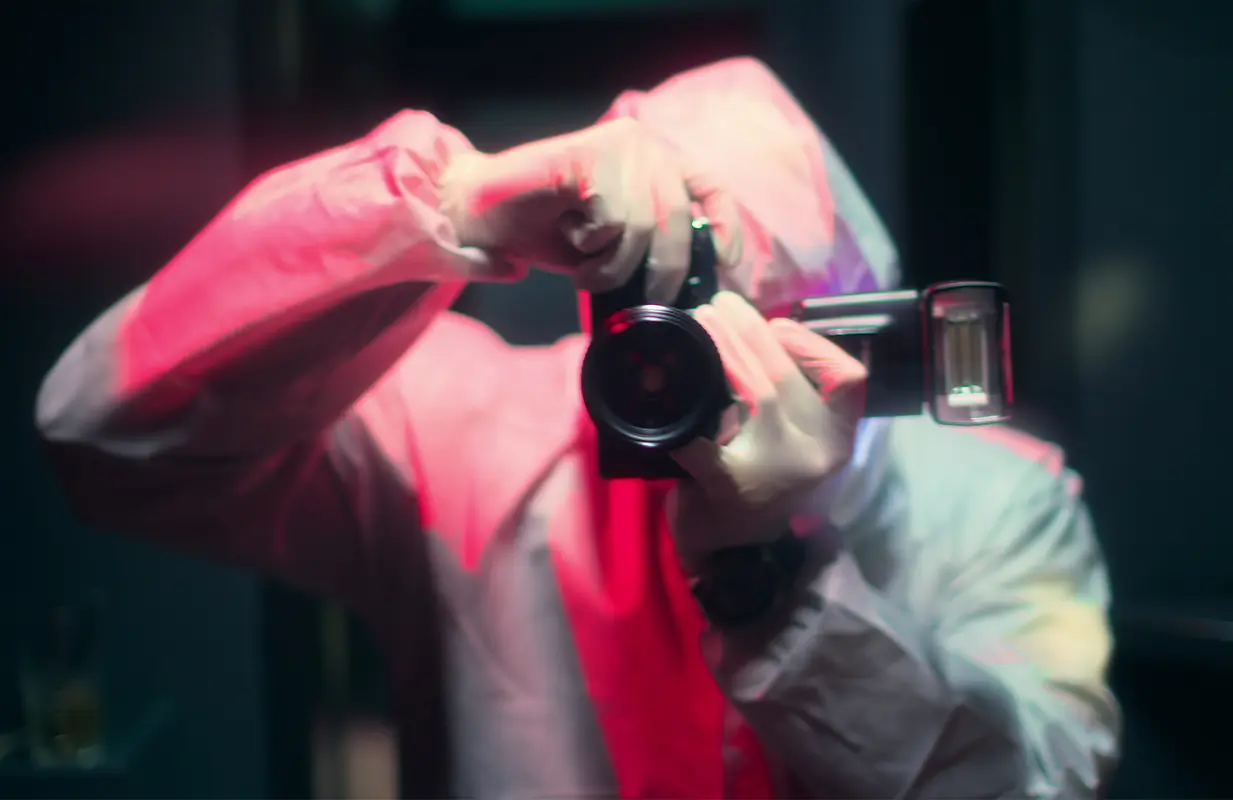Netflix's Nightlife Killer Fails to Dig Beneath the Surface
-
 Still from Crime Scene Berlin: Nightlife Killer (Image: Netflix)
Still from Crime Scene Berlin: Nightlife Killer (Image: Netflix)True-crime programming is sometimes thought of as a “guilty pleasure,” a kind of junk food that’s addictive and easy to indulge in even if it lacks substance. For better or worse, however, the genre can have a real impact. Sometimes a true-crime doc merely feels exploitative; other times, it may spark widespread conversation about difficult topics, like ID Discovery’s recent Quiet on Set, or bring attention to victims from underrepresented communities.
Crime Scene Berlin: Nightlife Killer is the latest entry in the streamer’s Crime Scene collection, which also includes The Vanishing at the Cecil Hotel, The Times Square Killer, and The Texas Killing Fields. The three-part docuseries centers on a series of grisly murders that rocked Berlin’s LGBTQ+ party scene in 2012. “The Darkroom Murderer,” also referred to in the doc as “Dirk,” used the drug GHB to incapacitate his victims before robbing and killing them; he specifically targeted gay men, despite being gay himself. Dirk ultimately killed three men before he was caught. The case, which is disturbing, complex, and not widely known, absolutely deserves a deep dive. However, the docuseries is so focused on the big picture that it glosses over the specific elements that make this particular case so harrowing.
Episode 1, “A Mysterious Death,” kicks things off by painting a vivid picture of Berlin’s seemingly “magic” party scene. “Getting high on drugs is part of our nature,” a techno DJ in German explains over montages of crowds dancing, kissing, and drinking. “The possibilities here are endless. But at the same time, this party scene does have a dark side.” Things quickly take a chilling turn, delving into how the first victim, Alexander, was killed in the dark room at a gay club. His sister recalls getting a phone call from the police informing her that her brother was found dead in a bar. “In a matter of seconds, [he was] gone. Vanished,” she says in disbelief. What makes this especially heartbreaking is that Alexander was murdered in what was supposed to be a safe place — the words “Queer & Friends” are even displayed on the front of the building.
While the doc does make some effort to center the victims, viewers don’t get much of a chance to absorb who they actually were. A lot of time is instead spent on the investigation and how the police ultimately cracked the case, which isn’t too surprising. However, the docuseries makes a sharp pivot in Episode 2, “A Serial Killer in Berlin,” when it puts its focus squarely on Dirk and his possible motives. Concentrating on the killer himself isn’t necessarily a bad thing, but the way the producers approach the matter leaves a lot to be desired, choosing to focus on the very broad question of why some people kill.
It’s a valid question, but one that ends up overshadowing this particular set of murders. There are so many more interesting ways that the producers could have approached this case, which is so layered that it can’t possibly be done justice in just three short episodes. There’s so much to unpack: the culture of the dark rooms, how the murders affected Berlin’s LGBTQ+ community and the party scene at large, the victims’ backgrounds. Instead, the docuseries is more interested in trying to answer the impossible question of what could possibly drive someone to commit murder.
That’s not to say that Crime Scene Berlin: Nightlife Killer is boring or a total waste of time. There are some things it does well — for instance, the choice to include narration from Dirk’s point of view adds a lot to the story. He says that he would have been happy just living a quiet life with his boyfriend, but his “urge” to kill was too strong to ignore. A particularly chilling moment is when he describes how he supposedly “cared” about his victims and wasn’t just a cold-blooded killer who took pleasure in their suffering, insisting “That’s not who I am.” The interviews with his aunt also provide some insight into his disturbing childhood (along with other possible crimes he may have committed), and the ending is a gut punch. But in the end, the docuseries still feels like it’s playing it safe.
The best true-crime docs are successful because they aren’t afraid to dig beneath the surface and focus on specific aspects of the topic or case at hand. HBO’s Last Call: When a Serial Killer Stalked Queer New York not only centered the victims, but took a close look at their complicated lives. Instead of just being presented as murder victims, they were shown to be real, complex people.
Ultimately, Crime Scene Berlin: Nightlife Killer is watchable enough, but it could have actually shed a light on an important but little-known case in the LGBTQ+ community. Instead, it ends up feeling like just another title in Netflix’s growing true-crime collection.
Crime Scene Berlin: Nightlife Killer is streaming on Netflix. Join the true crime discussion in our forums.
Kelly Martinez is a TV Reporter based in Los Angeles. Her previous work can be found at BuzzFeed and People Magazine, among other outlets. She enjoys reading, spending time with her cat, and explaining the plot of Riverdale to people.
TOPICS: True Crime, Netflix, Crime Scene Berlin: Nightlife Killer, Beetz Brothers Film Production, Caroline Schaper, Jan Zabeil, Joe Berlinger
- Where is David Berkowitz now? Son of Sam embraced Christianity in prison
- What really happened to Jodi Huisentruit that morning in 1995? Here’s why investigators suspect foul play
- What happened to Jodi Huisentruit? Everything to know about the new suspect
- What really happened to Amy Bradley? Her 1998 cruise ship disappearance still baffles investigators